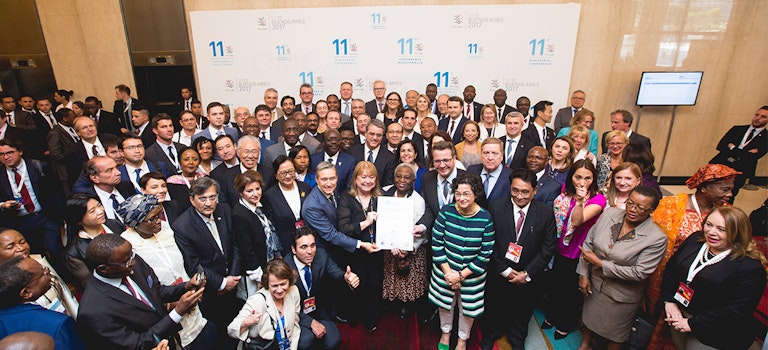(Buenos Aires) – For the first time at a World Trade Organization Ministerial Conference, members and observers have today issued a declaration calling for greater inclusion of women in trade.
121 members and observers have so far signed up to the Buenos Aires Declaration on Women and Trade, which was handed over to Susana Malcorra, the Chair of the WTO 11th Ministerial Conference (MC11), and WTO Director-General Roberto Azevêdo, by Iceland’s Minister for Foreign Affairs and External Trade, Gudlaugur Thór Thórdarson, Arancha González, Executive Director of the International Trade Centre, and Ambassador Yvette Stevens, Head of Sierra Leone’s Delegation to MC11. The Declaration aims to provide members with a framework and platform to foster a more inclusive trade agenda.
The Declaration serves to to reaffirm the link between gender and trade, and is crucial in emphasizing the role that women can play in the global economy.
Through the Buenos Aires Declaration on Women and Trade, WTO members voluntarily undertake, over the next two years, to cooperate with each other and to share best practices in five key areas. They will exchange information about what has worked – and what has not – in their attempts to collect gender-disaggregated economic data and to encourage women’s participation in the economy. Within the WTO context, they will scrutinize their own policies through a gender lens and find ways to work together to increase women’s participation in the world economy. They will also seek to ensure that trade-related development assistance pays better attention to its focus and impact on women.
The Buenos Aires Declaration is the result of a coordinated effort by the Trade Impact Group (TIG) of the International Gender Champions. The TIG was established as one of four ‘impact groups’ under the auspices of the International Gender Champions– a leadership network that brings female and male decision-makers together to break down gender barriers. Work on the Declaration was spearheaded by the TIG co-chairs: the Government of Iceland, the Government of Sierra Leone and the International Trade Centre.
Iceland’s Minister for Foreign Affairs and External Trade, Gudlaugur Thór Thórdarson, said: ‘Trade can help advance women’s economic empowerment and is also good for the economy. Therefore focusing on women and trade is not only the right thing to do, it also makes economic sense.’
Arancha González, ITC’s Executive Director, said: ‘Lowering the barriers facing women entrepreneurs, at home and internationally, would bolster growth and make it more socially inclusive. It would mean more and better-paid jobs for women – not least since women-owned firms hire more women, especially at higher levels. And it would go a long way towards realizing Goal 5 of the 2030 Agenda on Sustainable Development on achieving gender equality and empowering all women and girls.’
Cecilia Malmström, the European Commissioner for Trade, said: ‘For us to truly reap the benefits of trade, women’s independence and entrepreneurship need to take centre-stage in our policies. We need to transform ideas into action.’
Ann Linde, Sweden’s Minister for EU Affairs and Trade, said: ‘Getting more women involved in is sound economic policy for all countries, regardless of their level of development. Gender inequality is something none of us can afford.’
Kamina Johnson Smith, Jamaica’s Minister of Foreign Affairs and Foreign Trade, said: ‘Greater participation of women in international trade will generate sustainable jobs boost global growth. I support the Women and Trade Declaration because trade policy is critical in making that possible.’
Heraldo Muñoz, Chile’s Minster of Foreign Affairs, said: ‘Economic empowerment of women is a priority in the negotiation of trade policies and export promotion actions conducted by our government. This is why I support the Declaration on Women and Trade.’
François-Philippe Champagne, Canada’s Minister for International Trade, said: ‘Canada has been a lead in advancing the Declaration on Women and Trade. We encourage countries to champion inclusive, progressive approaches to trade.’
Ambassador Yvette Stevens, Sierra Leone’s Head of Delegation to MC11, said: ‘The structural imbalances, which contribute to an unequal distribution of the benefits from trade must be acknowledged and acted upon.’
>>> Download the Buenos Aires Declaration on Women and Trade here

It is also available en français and en español.
Supporters of the Buenos Aires Declaration on Women and Trade: Afghanistan, Albania, Angola, Argentina, Australia, Barbados, Benin, Brazil, Burundi, Cambodia, Canada, Chad, Chile, China, Colombia, Costa Rica, Côte d'Ivoire, Democratic Republic of the Congo, Dominica, Dominican Republic, Ecuador, El Salvador, Ethiopia, European Union member states (Austria, Belgium, Bulgaria, Croatia, Cyrus, Czech Republic, Denmark, Estonia, Finland, France, Germany, Greece, Hungary, Ireland, Italy, Latvia, Lithuania, Luxembourg, Malta, Netherlands, Poland, Portugal, Romania, Slovak Republic, Slovenia, Spain, Sweden, United Kingdom), Fiji, Gabon, Gambia, Grenada, Guatemala, Guinea, Guinea Bissau, Guyana, Haiti, Honduras, Iceland, Indonesia, Israel, Jamaica, Japan, Kazakhstan, Kenya, Korea (Republic of), Kyrgyzstan, Lao People's Democratic Republic, Lesotho, Liberia, Liechtenstein, Madagascar, Malawi, Malaysia, Mali, Mauritius, Mexico, Moldova, Mongolia, Montenegro, Myanmar, Namibia, Nepal, New Zealand, Niger, Nigeria, Norway, Pakistan, Panama, Paraguay, Peru, Philippines, Russia, Rwanda, Saint Kitts and Nevis, Saint Vincent and the Grenadines, Samoa, Senegal, Serbia, Sierra Leone, Somalia, Sudan, Swaziland, Switzerland, Chinese Taipei, Tajikistan, The Former Yugoslav Republic of Macedonia, Togo, Tonga, Trinidad and Tobago, Tunisia, Turkey, Uganda, Ukraine, United Arabe Emirates, Uruguay, Vanuatu, Viet Nam, Zambia.
For more information and contact, see ITC press release.
